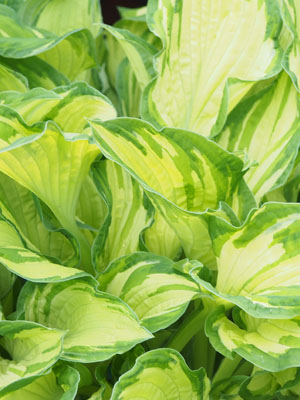Crop Rotation Group
Miscellaneous
|

|
Soil
Fertile, well-drained soil enriched with compost, with a neutral to slightly acidic pH.
|
Position
Partial shade.
|
Frost tolerant
Yes, hostas are hardy perennials. Well-rooted plants of many varieties are hardy to -30°F (-34°C).
|
Feeding
Drench with a liquid organic fertilizer when new foliage emerges in late spring or early summer. Feed again in late summer to nourish the glossy foliage.
|
Companions
-
|
Spacing
Single Plants: 11" (30cm) each way (minimum)
Rows: 11" (30cm) with 11" (30cm) row gap (minimum)
|
Sow and Plant
Potted plants of improved varieties are widely available in spring. Set out plants as early as possible, while the soil is still cool. Set plants slightly high so the crown is above the soil line. Young plants need water when they are actively growing. A surface mulch suppresses weeds while making the plants look more attractive. After three years or so, clumps may begin to die out in the middle. Dig up the clump in early spring, use a sharp knife or spade to divide it into pieces, and replant them right away.
Our Garden Planning Tool can produce a personalized calendar of when to sow, plant and harvest for your area.
|
Notes
Hostas are grown as much for their colorful foliage as for their late summer flowers, and they are ideal for shady places where little else will grow. Hostas are not affected by black walnuts and can be grown in their shade. Varieties vary in size, from giants to dainty dwarfs, so check plant tags when shopping for plants.
|
Harvesting
Hosta leaves or flowers can be used in cut arrangements as you need them. The plants do not rebloom, so you can prune ragged flowering spikes to better showcase the pretty foliage.
|
Troubleshooting
Slugs and snails are frequent visitors, especially in spring. Summer hailstorms can shred hostas to bits, but they will grow back. Overly wet conditions can lead to crown rot. Deer and rabbits love to nibble hosta foliage.
|